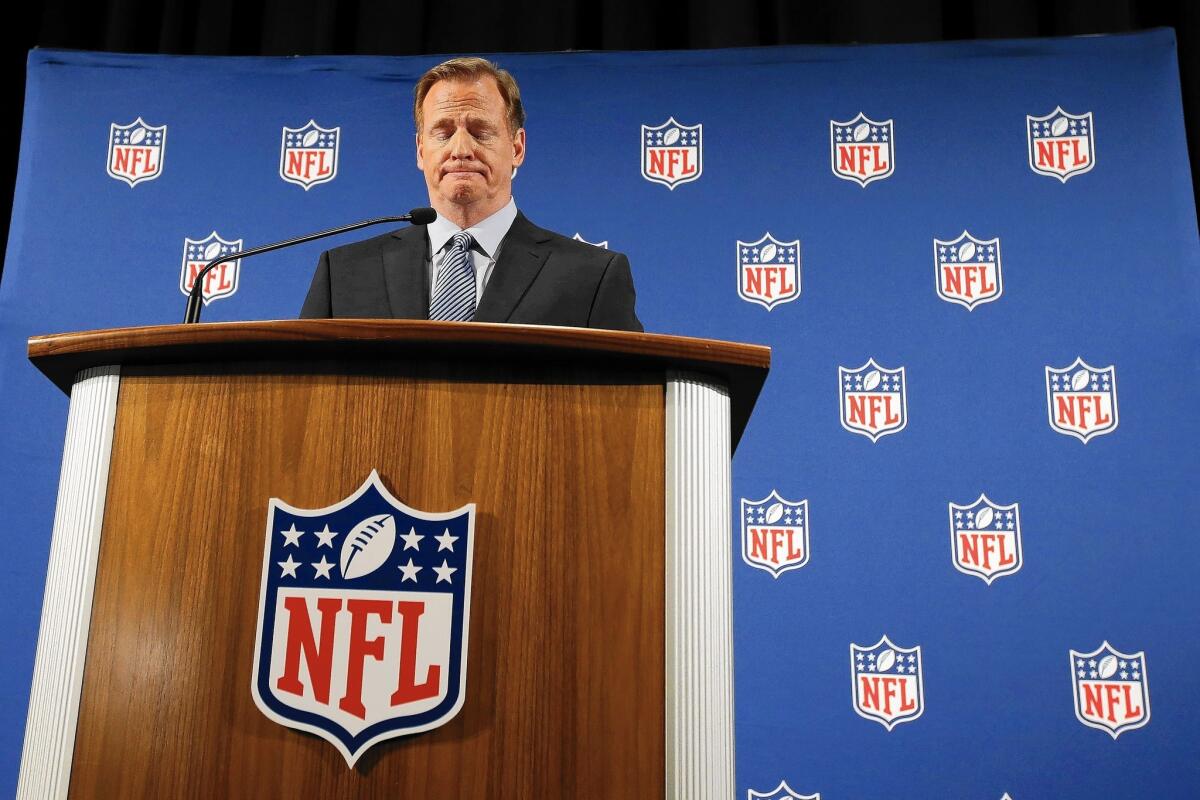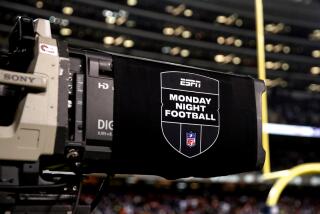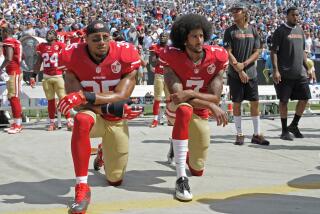NFL’s reach holds sponsors

Corporate sponsors headed for the stadium exits after the racist rant by former Los Angeles Clippers owner Donald Sterling. Five months later, domestic violence scandals have rocked the National Football League, but major advertisers have opted merely to scold the organization for not doing more to curb bad player behavior.
Although the issues and sports are different, the main distinctions are scale and need, experts say. The NFL represents a gigantic marketing opportunity that corporations would be loath to give up.
“I don’t foresee any real defections or loss of sponsors,” said Robert Boland, a professor of sports business at New York University. “The NFL has such a giant viewership. If you are already there, you are paying the extreme top dollar and you are a product that needs that platform.”
The NFL rakes in nearly $10 billion in annual revenue; last year, 205 million viewers watched league games on television, according to Nielsen.
And that viewership hasn’t declined despite the heavy attention focused in recent weeks on several domestic abuse cases involving NFL players. Those include former Baltimore Ravens running back Ray Rice, who was caught on camera in February knocking his then-fiancee unconscious in an elevator, and Adrian Peterson of the Minnesota Vikings, who has been indicted on charges of child abuse because he allegedly hit his 4-year-old son with a tree branch or switch.
“The cynic in me says the brands will wait to see what the ratings say,” said Chris Cakebread, who teaches sports marketing at Boston University. “There has been no noticeable decline from week two to week three. They’ll wait to see if this passes over.”
So far, major sponsors have yet to break with the NFL, although Procter & Gamble did back away from a promotional effort with the league for Breast Cancer Awareness Month. Instead, companies have denounced the alleged misconduct of players and admonished the NFL for how it handled the cases.
Budweiser maker Anheuser-Busch said last week that it was “increasingly concerned by the recent incidents which have overshadowed this NFL season.” McDonald’s said it was “closely monitoring” the situation. Marriott Hotels said it would review its sponsorship of the league after the investigation was concluded.
That’s a sharp contrast to the advertiser reaction after celebrity gossip site TMZ in April released a recording of then Clippers owner Sterling criticizing a female friend for “associating with black people.”
In the aftermath, more than a dozen sponsors, including Virgin America, CarMax and State Farm, canceled or suspended their deals with the basketball team. Kia Motors also suspended its advertising after calling the comments “offensive and reprehensible.”
Sterling was forced to sell the team. Former Microsoft Chief Executive Steve Ballmer bought the Clippers for $2 billion in August.
Experts say companies are more cautious with the NFL because the marketing appeal of one basketball team can’t compare with the reach of the football league.
In a recent survey, U.S. adults ranked pro football as their favorite sport, followed by Major League Baseball and college football, according to the Harris Poll. The National Basketball Assn. was ranked fifth, behind auto racing.
Advertisers consider football a reliable way of getting to millions of potential customers — no small feat at a time when DVRs have made it easy for viewers to fast-forward through commercials on anything but live programming.
“It’s really hard to compare the Clippers to the National Football League,” Cakebread said. “Certainly the Clippers became a national story … but the stakes and the money and the impact are so great on the NFL side.”
Any negative repercussions will be seen at the team and individual player level ran than league-wide, observers said.
Radisson Hotels suspended its sponsorship of the Minnesota Vikings after the child abuse allegations against Peterson were aired. Nike terminated its contract with Rice and suspended its endorsement deal with Peterson. Target Corp. said it had removed merchandise featuring both players from store shelves. EA Sports also dropped Rice from its Madden NFL 15 video game.
The NFL and the affected teams also stepped up their punishment of the players after critics pilloried their initial reaction as too lenient.
Rice, who was originally suspended from two games in July, was dumped by the Ravens and indefinitely suspended from the NFL. Peterson has been barred from all team activities.
At a Friday news conference, NFL Commissioner Roger Goodell said he was determined to “get our house in order,” including creating a personal conduct committee and hiring four female advisors to craft its domestic abuse policies.
Goodell has faced accusations that the league misled the public over how much it knew about the video depicting Rice physically abusing his fiancee, who is now his wife. He and the NFL have maintained that they had not previously seen the video before TMZ posted it online.
Despite the NFL’s advertising power, sponsors may flee if information comes to light proving that Goodell lied about how much he knew.
That may have a bigger effect on both viewership and merchandise sales, especially among the 45% of NFL fans who are female, experts say.
“Dishonesty is more significant than incompetence,” said Wendy Patrick, a business ethics lecturer at San Diego State University. “That will probably make some sponsors reconsider.”
Twitter: @ByShanLi







